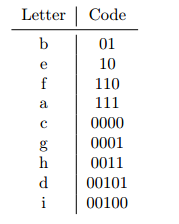We have the word "w = aabceefgeebdaabbceeffghdcbbeefbbbbghhie ".
I have created a Huffman tree for the string w.
We get the following table:
Now I want to create a Huffman tree for a Block-Code with length of block $4$.
Do we maybe take each consecutive 4 letters, i.e., {aabc, eefg, eebd, aabb, ceef, fghd, cbbe, efbb, bbgh, hie} to make the tree?
But then the last one is of length 3 and not 4.
So, do we choose in an other way the blocks?

